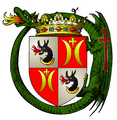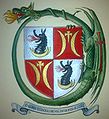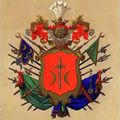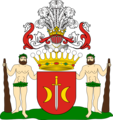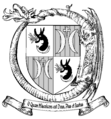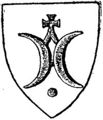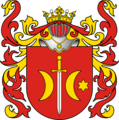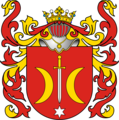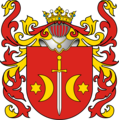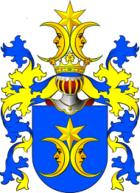Heraldyka: Różnice pomiędzy wersjami
| (Nie pokazano 15 wersji utworzonych przez 2 użytkowników) | |||
| Linia 7: | Linia 7: | ||
Those Coa are painted according to heraldic rules, those are true to the heritage of ancient Ostoja families. The last two photo's are of Nicolaus Ostoja de Sciborzyce (Lesser Poland) from ab. 1232 that can be seen on the walls of the Church that he partly rased (finished) and the last is from the seal of Dobieslaw de Koszyce in year 1381. It is significant that both seal and the sign on the Church wall are identical. Therefore, we can presume that it is original sign of the family, at least from the time when family joined christian society. | Those Coa are painted according to heraldic rules, those are true to the heritage of ancient Ostoja families. The last two photo's are of Nicolaus Ostoja de Sciborzyce (Lesser Poland) from ab. 1232 that can be seen on the walls of the Church that he partly rased (finished) and the last is from the seal of Dobieslaw de Koszyce in year 1381. It is significant that both seal and the sign on the Church wall are identical. Therefore, we can presume that it is original sign of the family, at least from the time when family joined christian society. | ||
| − | ''' | + | '''Ostoja Coat of Arms:''' |
| + | |||
| + | In first row from the left ancient Ostoja Coat of arms painted by Steifer followed by the reconstruction of the CoA of Stibor of Stiboricz with the symbol of the Order of the Dragon. Third from the left is modern version of the CoA as in allmost all documents form 19th century and that copy errors from 16th century. This CoA is common on all of the nobility verification documents from late XVIII and through XIX century. | ||
| + | |||
| + | After modern version of Ostoja CoA from left, a version with simple Shield and Crown, note here the Crown that is different from most of published in books. This crown have been used by Ostoja families and is presented in several old documents. Next from the left is CoA with the Order of the Dragon painted by Steifer and after CoA of Stibor without the symbol of the Order of the Dragon with Crown of the Duke. After that - original Ostoja Coat of arms painted by Steifer using gold to color and with motto of the Order of the Dragon. | ||
| + | |||
| + | Then different modern versions and last two old signs, the last one from the walls of the Church of Wysocice from 1232. | ||
| + | |||
| + | |||
<gallery> | <gallery> | ||
| Linia 17: | Linia 25: | ||
Plik:Stibor coa.jpg | Plik:Stibor coa.jpg | ||
Plik:Ostoja zlocona.jpg | Plik:Ostoja zlocona.jpg | ||
| − | Plik: | + | Plik:Ostoja walczaca.jpg |
Plik:Sedzimir CoA.gif | Plik:Sedzimir CoA.gif | ||
Plik:Ostoja mikorskich.png | Plik:Ostoja mikorskich.png | ||
| Linia 28: | Linia 36: | ||
==Imaginary Ostoja Coa== | ==Imaginary Ostoja Coa== | ||
| − | Those Coat of arms as below are of noble families and linked ''en masse'' to Ostoja simply because the moon or the sword in the shield. The list of imaginary Ostoja Coat of arms might be longer than here presented. There are also Russian families that was ennobled and given the Coat of arms that also looked like Ostoja during the partition time and that some call Ostoja. It is also possible that | + | Those Coat of arms as below are of noble families and linked ''en masse'' to Ostoja simply because the moon or the sword in the shield. The list of imaginary Ostoja Coat of arms might be longer than here presented. There are also Russian families that was ennobled and given the Coat of arms that also looked like Ostoja during the partition time and that some call Ostoja. It is also possible that CoA where painted with error during nobility verification process in the time of partition. |
| − | === | + | === Odminany Ostoi które nie są herbem Ostoja === |
'''Families that are members of the Clan of Ostoja - rodziny które należą do rodu Ostoja:''' | '''Families that are members of the Clan of Ostoja - rodziny które należą do rodu Ostoja:''' | ||
| − | From the left: [[Błyszczanowicz]] - [[ancient nobility|ancient]] family noted in year 1497, error in 1806 by Russian authorities in Kiev that painted the CoA in wrong way. '''[[Miklaszewski]]''' - this family was adopted to the Clan of Ostoja in 1569 when family received nobility. Suppose to sign original Ostoja CoA. Third from the left is [[Ochocki]] CoA that received nobility in year 1683 and was adopted to the Clan of Ostoja and sign modern version of Ostoja with sword instead of a cross. Fourth from the left, [[Gawłowski]] family of [[ancient nobility|ancient]] origin and with CoA that is simple error of foreign authorities, suppose to be original version of Ostoja. [[Strzałkowski]] (Strzałka) family is of [[ancient nobility|ancient]] origin, also here the CoA is modified during partition of the Commonwealth but here most probably family helped authorities to change their original CoA. Purpose or reason of that is not known. | + | From the left: [[Błyszczanowicz]] - [[ancient nobility|ancient]] family noted in year 1497, error in 1806 by Russian authorities in Kiev that painted the CoA in wrong way. '''[[Miklaszewski]]''' - this family was adopted to the Clan of Ostoja in 1569 when family received nobility. Suppose to sign original Ostoja CoA. Third from the left is [[Ochocki]] CoA that received nobility in year 1683 and was adopted to the Clan of Ostoja and sign modern version of Ostoja with sword instead of a cross. Fourth from the left, [[Gawłowski]] family of [[ancient nobility|ancient]] origin and with CoA that is simple error of foreign authorities, suppose to be original version of Ostoja. [[Strzałkowski]] (Strzałka) family is of [[ancient nobility|ancient]] origin, also here the CoA is modified during partition of the Commonwealth but here most probably family helped authorities to change their original CoA. Purpose or reason of that is not known. CoA of [[Nagorski]] family that received nobility in year 1590 and was adopted to the Clan of Ostoja. Suppose to sign old version of the CoA. Note that there is another family of Nagorski of ancient origin but it is almost impossible now to separate those families from each other. Finally Mokrzewski family that is same with Mokrzecki. |
<gallery> | <gallery> | ||
| Linia 43: | Linia 51: | ||
Plik:595px-POL COA Strzałkowski.svg.png | Plik:595px-POL COA Strzałkowski.svg.png | ||
Plik:451px-POL COA Nagórski.svg.png | Plik:451px-POL COA Nagórski.svg.png | ||
| + | Plik:451px-POL COA Mokrzewski.svg.png | ||
</gallery> | </gallery> | ||
'''Families that are NOT members of the Clan of Ostoja - rodziny które NIE należą do rodu Ostoja:''' | '''Families that are NOT members of the Clan of Ostoja - rodziny które NIE należą do rodu Ostoja:''' | ||
| − | First row from the left: '''Bogorajski''', received nobility year 1775 and a rang crown of a Baron not being a Baron, although in this version crown of the noble by error since there are no other paintings of correct CoA jet. Next CoA is of '''Raczewski (Racięski)''' family that also received nobility in year 1775. The CoA of '''Kleczewski | + | First row from the left: '''Bogorajski''', received nobility year 1775 and a rang crown of a Baron not being a Baron, although in this version crown of the noble by error since there are no other paintings of correct CoA jet. Next CoA is of '''Raczewski (Racięski)''' family that also received nobility in year 1775. The CoA of '''Kleczewski''' family that was not members of the Clan. Last three CoA in this row are of families '''Orda''', '''Plat''' and '''Wasilewski''' - none of them are members of the Clan, CoA have been simply added to Ostoja and are called modified Ostoja CoA. In the case of Wasilewski, there could be question of error in paining of the CoA and family could actually be part of the Clan. Further research is necessary. |
<gallery> | <gallery> | ||
| Linia 53: | Linia 62: | ||
Plik:595px-POL COA Racięski.svg.png | Plik:595px-POL COA Racięski.svg.png | ||
Plik:595px-POL COA Kleczewski.svg.png | Plik:595px-POL COA Kleczewski.svg.png | ||
| − | |||
Plik:451px-POL COA Orda.svg.png | Plik:451px-POL COA Orda.svg.png | ||
Plik:456px-POL COA Plat.svg.png | Plik:456px-POL COA Plat.svg.png | ||
| Linia 75: | Linia 83: | ||
Finally, below is the Coat of arms of ancient German family of von Finkenstein, also written as '''Fink von Finkenstein''' referring to family of Fink that is noted in German records already in XIII century. This family moved at that time to the land occupied by Teutonic Knights. In time this family become one of most prominent German families owning great estates, palaces and holding highest positions, they belong to the top of German aristocracy. | Finally, below is the Coat of arms of ancient German family of von Finkenstein, also written as '''Fink von Finkenstein''' referring to family of Fink that is noted in German records already in XIII century. This family moved at that time to the land occupied by Teutonic Knights. In time this family become one of most prominent German families owning great estates, palaces and holding highest positions, they belong to the top of German aristocracy. | ||
| − | It is not known who invented to call this | + | It is not known who invented to call this coat of arms '''''Ostoja Pruska''''' but it is significant example of breaking every possible heraldic rule in the name of Polish clan tradition where clan members used same coat of arms. It seems that this coat of arms was added to Ostoja almost by force. There are two families that was part of the Clan of Ostoja in 14th century according to the records of Teutonic Knights, they lived in Pomerania and that have been given this coat of arms by all publications - the families of '''[[Lniski]]''' and '''Skrzyszewski vel [[Skrzeszewski]]'''. Here is is notable that the Skrzyszewski vel Skrzeszewski line in 18th century suddenly changed their name to Lniski. It is not known if there is any blood realtion between those families around 14th century. |
| − | It is presumed that | + | It is presumed that both families with roots dating back to the 14th century used the original Ostoja coat of arms and just because this family lived in Pomerania or Prussia, they have been given the coat of arms of the Finck family and called it "Ostoja Pruska". |
Aktualna wersja na dzień 12:02, 5 lut 2022
Heraldyka - Heraldry
Article on Wikipedia (Artykuł na Wikipedii)
True Ostoja Coat of arms - prawdziwe herby Ostoja
Those Coa are painted according to heraldic rules, those are true to the heritage of ancient Ostoja families. The last two photo's are of Nicolaus Ostoja de Sciborzyce (Lesser Poland) from ab. 1232 that can be seen on the walls of the Church that he partly rased (finished) and the last is from the seal of Dobieslaw de Koszyce in year 1381. It is significant that both seal and the sign on the Church wall are identical. Therefore, we can presume that it is original sign of the family, at least from the time when family joined christian society.
Ostoja Coat of Arms:
In first row from the left ancient Ostoja Coat of arms painted by Steifer followed by the reconstruction of the CoA of Stibor of Stiboricz with the symbol of the Order of the Dragon. Third from the left is modern version of the CoA as in allmost all documents form 19th century and that copy errors from 16th century. This CoA is common on all of the nobility verification documents from late XVIII and through XIX century.
After modern version of Ostoja CoA from left, a version with simple Shield and Crown, note here the Crown that is different from most of published in books. This crown have been used by Ostoja families and is presented in several old documents. Next from the left is CoA with the Order of the Dragon painted by Steifer and after CoA of Stibor without the symbol of the Order of the Dragon with Crown of the Duke. After that - original Ostoja Coat of arms painted by Steifer using gold to color and with motto of the Order of the Dragon.
Then different modern versions and last two old signs, the last one from the walls of the Church of Wysocice from 1232.
Imaginary Ostoja Coa
Those Coat of arms as below are of noble families and linked en masse to Ostoja simply because the moon or the sword in the shield. The list of imaginary Ostoja Coat of arms might be longer than here presented. There are also Russian families that was ennobled and given the Coat of arms that also looked like Ostoja during the partition time and that some call Ostoja. It is also possible that CoA where painted with error during nobility verification process in the time of partition.
Odminany Ostoi które nie są herbem Ostoja
Families that are members of the Clan of Ostoja - rodziny które należą do rodu Ostoja:
From the left: Błyszczanowicz - ancient family noted in year 1497, error in 1806 by Russian authorities in Kiev that painted the CoA in wrong way. Miklaszewski - this family was adopted to the Clan of Ostoja in 1569 when family received nobility. Suppose to sign original Ostoja CoA. Third from the left is Ochocki CoA that received nobility in year 1683 and was adopted to the Clan of Ostoja and sign modern version of Ostoja with sword instead of a cross. Fourth from the left, Gawłowski family of ancient origin and with CoA that is simple error of foreign authorities, suppose to be original version of Ostoja. Strzałkowski (Strzałka) family is of ancient origin, also here the CoA is modified during partition of the Commonwealth but here most probably family helped authorities to change their original CoA. Purpose or reason of that is not known. CoA of Nagorski family that received nobility in year 1590 and was adopted to the Clan of Ostoja. Suppose to sign old version of the CoA. Note that there is another family of Nagorski of ancient origin but it is almost impossible now to separate those families from each other. Finally Mokrzewski family that is same with Mokrzecki.
Families that are NOT members of the Clan of Ostoja - rodziny które NIE należą do rodu Ostoja:
First row from the left: Bogorajski, received nobility year 1775 and a rang crown of a Baron not being a Baron, although in this version crown of the noble by error since there are no other paintings of correct CoA jet. Next CoA is of Raczewski (Racięski) family that also received nobility in year 1775. The CoA of Kleczewski family that was not members of the Clan. Last three CoA in this row are of families Orda, Plat and Wasilewski - none of them are members of the Clan, CoA have been simply added to Ostoja and are called modified Ostoja CoA. In the case of Wasilewski, there could be question of error in paining of the CoA and family could actually be part of the Clan. Further research is necessary.
Second row from the left: CoA of Fincke von Finkenthal family that received nobility in 1805, CoA of Ostaszewski family that received nobility in 1785, here we believe that the name is wrong spelled, should be Ostarzewski. Third CoA from the left is of Krall family that received nobility in year 1768 followed by the CoA of Szyszko family that should be not mixed up with ancient Szyszkowski de Szyszki family. The CoA of Turkuł family that received nobility in year 1676, this family is extinct The last two CoA in the row are of Wysocki and Zawadzki families. Both families have never been considered as members of the Clan of Ostoja but also here their CoA become recognized as Ostoja with modification. In the case of Wysocki family belong to the Clan of Kolumna with modified CoA called Kolumna ze skrzydlami - Kolumna with wings.
von Finkenstein Coat of Arms
Finally, below is the Coat of arms of ancient German family of von Finkenstein, also written as Fink von Finkenstein referring to family of Fink that is noted in German records already in XIII century. This family moved at that time to the land occupied by Teutonic Knights. In time this family become one of most prominent German families owning great estates, palaces and holding highest positions, they belong to the top of German aristocracy.
It is not known who invented to call this coat of arms Ostoja Pruska but it is significant example of breaking every possible heraldic rule in the name of Polish clan tradition where clan members used same coat of arms. It seems that this coat of arms was added to Ostoja almost by force. There are two families that was part of the Clan of Ostoja in 14th century according to the records of Teutonic Knights, they lived in Pomerania and that have been given this coat of arms by all publications - the families of Lniski and Skrzyszewski vel Skrzeszewski. Here is is notable that the Skrzyszewski vel Skrzeszewski line in 18th century suddenly changed their name to Lniski. It is not known if there is any blood realtion between those families around 14th century.
It is presumed that both families with roots dating back to the 14th century used the original Ostoja coat of arms and just because this family lived in Pomerania or Prussia, they have been given the coat of arms of the Finck family and called it "Ostoja Pruska".

